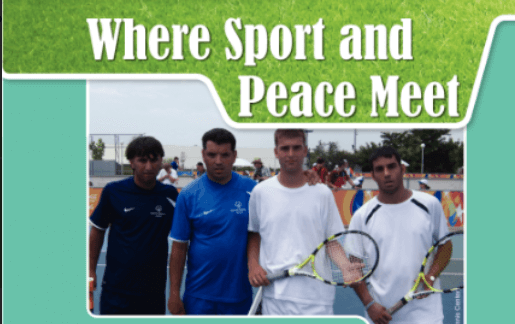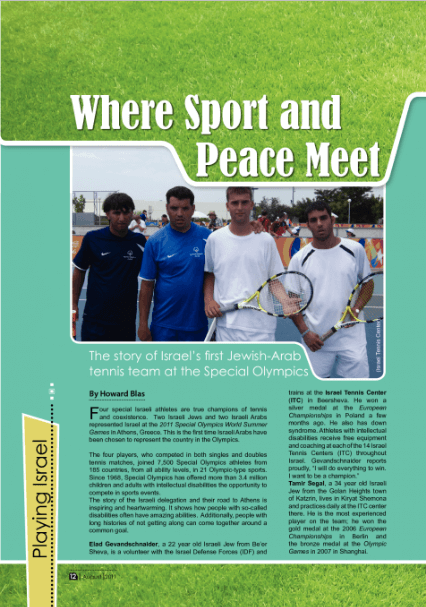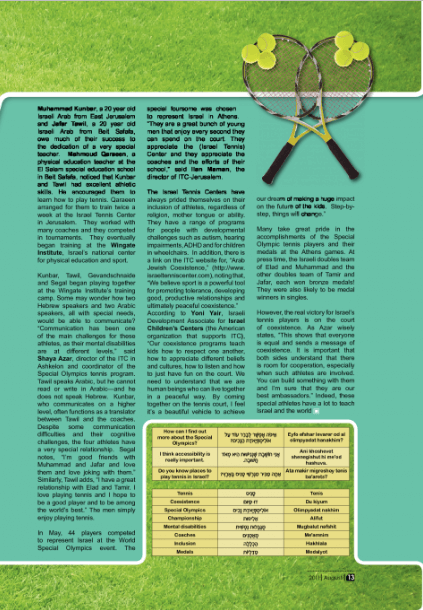Original Article Published on The Jerusalem Post
The story of Israel’s first Jewish-Arab tennis team at the Special Olympics
Four special Israeli athletes are true champions of tennis and coexistence. Two Israeli Jews and two Israeli Arabs represented Israel at the 2011 Special Olympics World Summer Games in Athens, Greece. This is the first time Israeli Arabs have been chosen to represent the country in the Olympics.
The four players, who competed in both singles and doubles tennis matches, joined 7,500 Special Olympics athletes from 185 countries, from all ability levels, in 21 Olympic-type sports. Since 1968, Special Olympics has offered more than 3.4 million children and adults with intellectual disabilities the opportunity to compete in sports events.
The story of the Israeli delegation and their road to Athens is inspiring and heartwarming. It shows how people with so-called disabilities often have amazing abilities.
Additionally, people with long histories of not getting along can come together around a common goal.
Elad Gevandschnaider, a 22 year old Israeli Jew from Be’er Sheva, is a volunteer with the Israel Defense Forces (IDF) and trains at the Israel Tennis Center (ITC) in Beersheva. He won a silver medal at the European Championships in Poland a few months ago. He also has down syndrome. Athletes with intellectual disabilities receive free equipment and coaching at each of the 14 Israel Tennis Centers (ITC) throughout Israel. Gevandschnaider reports proudly, I will do everything to win. I want to be a champion.
Tamir Segal, a 34 year old Israeli Jew from the Golan Heights town of Katzrin, lives in Kiryat Shemona and practices daily at the ITC center there. He is the most experienced player on the team; he won the gold medal at the 2006 European Championships in Berlin and the bronze medal at the Olympic Games in 2007 in Shanghai.
Muhammad Kunbar, a 20 year old Israeli Arab from East Jerusalem and Jafar Tawil, a 20 year old Israeli Arab from Beit Safafa, owe much of their success to the dedication of a very special teacher. Mahmoud Qaraeen, a physical education teacher at the El Salam special education school in Beit Safafa, noticed that Kunbar and Tawil had excellent athletic skills. He encouraged them to train twice a week at the Israel Tennis Center in Jerusalem. They worked with many coaches and they competed in tournaments. They eventually began training at the Wingate Institute, Israel’s national center for physical education and sport.
Kunbar, Tawil, Gevandschnaide and Segal began playing together at the Wingate Institute’s training camp. Some may wonder how two Hebrew speakers and two Arabic speakers, all with special needs, would be able to communicate? “Communication has been one of the main challenges for these athletes, as their mental disabilities are at different levels, said Shaya Azar, director of the ITC in Ashkelon and coordinator of the Special Olympics tennis program. Tawil speaks Arabic, but he cannot read or write in Arabic and he does not speak Hebrew. Kunbar, who communicates on a higher level, often functions as a translator between Tawil and the coaches. Despite some communication difficulties and their cognitive challenges, the four athletes have a very special relationship. Segal notes, I’m good friends with Muhammad and Jafar and love them and love joking with them. Similarly, Tawil adds, I have a great relationship with Elad and Tamir. I love playing tennis and I hope to be a good player and to be among the world’s best. The men simply enjoy playing tennis.
In May, 44 players competed to represent Israel at the World Special Olympics event. The special foursome was chosen to represent Israel in Athens. “They are a great bunch of young men that enjoy every second they can spend on the court. They appreciate the (Israel Tennis) Center and they appreciate the coaches and the efforts of their school,” said Ilan Maman, the director of ITC-Jerusalem.
The Israel Tennis Centers have always prided themselves on their inclusion of athletes, regardless of religion, mother tongue or ability. They have a range of programs for people with developmental challenges such as autism, hearing impairments, ADHD and for children in wheelchairs. In addition, there is a link on the ITC website for, Arab Jewish Coexistence, noting that, We believe sport is a powerful tool for promoting tolerance, developing good, productive relationships and ultimately peaceful coexistence. According to Yoni Yair, Israeli Development Associate for Israel Children’s Centers (the American organization that supports ITC), Our coexistence programs teach kids how to respect one another, how to appreciate different beliefs and cultures, how to listen and how to just have fun on the court. We need to understand that we are human beings who can live together in a peaceful way. By coming together on the tennis court, I feel it’s a beautiful vehicle to achieve our dream of making a huge impact on the future of the kids. Step-by-step, things will change.
Many take great pride in the accomplishments of the Special Olympic tennis players and their medals at the Athens games. At press time, the Israeli doubles team of Elad and Muhammad and the other doubles team of Tamir and Jafar, each won bronze medals! They were also likely to be medal winners in singles.
However, the real victory for Israel’s tennis players is on the court of coexistence. As Azar wisely states, This shows that everyone is equal and sends a message of coexistence. It is important that both sides understand that there is room for cooperation, especially when such athletes are involved. You can build something with them and I’m sure that they are our best ambassadors. Indeed, these special athletes have a lot to teach Israel and the world.





